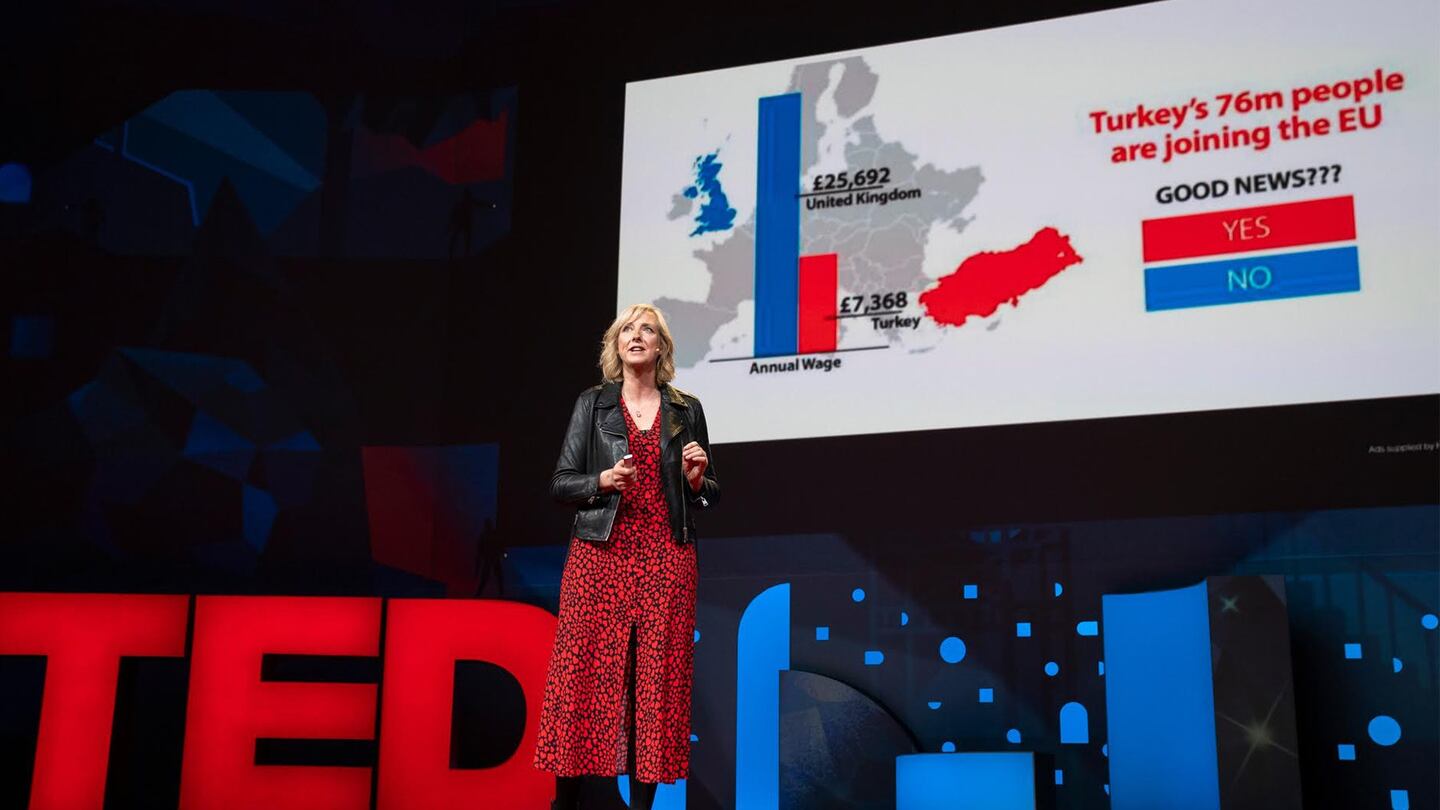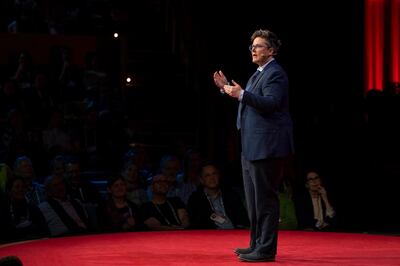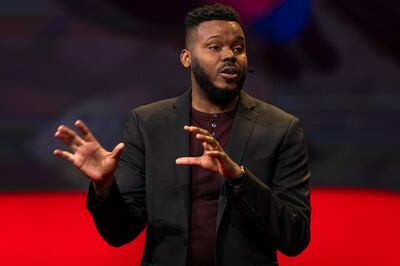
The Business of Fashion
Agenda-setting intelligence, analysis and advice for the global fashion community.

Agenda-setting intelligence, analysis and advice for the global fashion community.

VANCOUVER, Canada — Each year at TED, there is one talk that sets the tone for the more than 60 talks that follow afterwards, jolting the more than 2,000 conference attendees to attention, working its way into conversations over the rest of the week, and garnering media coverage around the world. A few years back it was Monica Lewinsky, in attendance at TED this year, who spoke about online bullying. Last year it was Jaron Lenier's talk on how we can make a better internet. And this year, it was undoubtedly Carole Cadwalladr's talk on 'Facebook's role in Brexit — and the threat to democracy.'
It was the beginning of yet another jam-packed week of TED talks, including a father lamenting the decline of global fertility, a paleoanthropologist lamenting the lack of frontline exploratory science in unstable areas of the world and a celebrated New York Times columnist lamenting the “long howling silences of loneliness” that are growing longer as we retreat into our work and away from other people. There was also research into how psychedelic drugs can act as telescopes into the mind, how culinary evangelism can act as a conduit for discussing race, class and inclusion and how video-gaming can give rise to a new kind of Florentine renaissance. Yes, video games as a renaissance.
Cadwalladr is the British journalist who rose to international prominence after she worked with VOICES 2018 speaker and Cambridge Analytica whistleblower Christopher Wylie to reveal the role Facebook played in the Brexit referendum and election of Donald Trump. In her talk, Cadwalladr outlined how, shortly after the Brexit referendum, she visited Ebbw Vale in her native South Wales to understand why they had overwhelmingly voted to leave the European Union, despite having benefited from hundreds of millions of euros in EU-funded infrastructure, education and sports investments.
Facebook has these answers, and it's refused to give them to us
“It came to a head when I met this young man in front of the sports centre. And he told me that he had voted to leave because the European Union had done nothing for him. He was fed up with it,” she explained. “And all around town, people told me the same thing. They said that they wanted to take back control, which was one of the slogans in the campaign. And they told me that they were most fed up with the immigrants and with the refugees. They'd had enough.”
ADVERTISEMENT
Turns out that in South Wales, there are, quite literally, almost no immigrants to be found. “I met one Polish woman who told me she was practically the only foreigner in town,” said Cadwalladr. “And when I checked the figures, I discovered that Ebbw Vale actually has one of the lowest rates of immigration in the country. I couldn't really understand where people were getting their information from.”
She soon learned that a barrage of ads, many of which were delivered in the final few days before the referendum vote and paid for by unknown entities, were targeted at people in South Wales and across the UK. “This entire referendum took place in darkness because it took place on Facebook. And what happens on Facebook stays on Facebook, because only you see your news feed, and then it vanishes, so it's impossible to research anything. We have no idea who saw what ads or what impact they had, or what data was used to target these people. Or even who placed the ads, or how much money was spent, or even what nationality they were.”
“But Facebook does. Facebook has these answers, and it's refused to give them to us,” she continued. “Our parliament has asked Mark Zuckerberg multiple times to come to Britain and to give us these answers. And every single time, he's refused. And you have to wonder why.”
This technology that you have invented has been amazing. But now, it's a crime scene. And you have the evidence.
Calling out these “Gods of Silicon Valley” by name, Facebook’s Zuckerberg and Sheryl Sandberg, Google’s Larry Page and Sergey Brin and Twitter’s Jack Dorsey, Cadwalladr said “this technology that you have invented has been amazing. But now, it's a crime scene. And you have the evidence. It is not enough to say that you will do better in the future. Because to have any hope of stopping this from happening again, we have to know the truth.”
That Facebook and Google are paid sponsors of TED, and that Dorsey appeared the next day on the same stage, speaks to TED’s unique position in holding its key stakeholders to account, while also including them in the conversations that push our culture forward, however difficult those topics may be.
As for Dorsey, while he was criticised by many of the people I spoke to for not providing more concrete solutions to the misinformation facilitated and amplified by social media, at least he deigned to show up. That’s more than Zuckerberg can say.
"Our purpose is to serve the public conversation, and we have seen a number of attacks on it," Dorsey confessed. "We've seen abuse, we've seen harassment, we've seen manipulation, automation, human coordination, misinformation. These are all dynamics that we were not expecting 13 years ago when we were starting the company."
Dorsey explained that "38 percent of abusive tweets are now proactively identified by machine learning algorithms so that people don't actually have to report them. But those that are identified are still reviewed by humans, so we do not take down content or accounts without a human actually reviewing it."
So, like other social media companies that are trying to solve the problems they have created, Dorsey did not offer any concrete solutions for how Twitter can possibly remake itself, nor on how we can dial back from social media, where there's micro-targeted advertising based on every piece of data that has been collected about our behaviours, and addictive loops keep us coming back for more.
ADVERTISEMENT
Our purpose is to serve the public conversation, and we have seen a number of attacks on it
“One of the choices we made in the early days was we had this number that showed how many people follow you. Was that the right decision at the time? Probably not. If I had to start the service again, I would not emphasise the follower count as much. I would not emphasize the "like" count as much. I don't think I would even create "like" in the first place,” added Dorsey.
But as head curator of TED Chris Anderson pointed out, it’s not only the social dynamics of companies like Twitter that are the underlying cause of the problem, it is also a business model rooted in creating obsessive attention and engagement designed to sell more advertising. Anderson challenged Dorsey to go further and faster.
“I woke up the other night with this picture of how I found I was thinking about you and the situation, that we're on this great voyage with you on this ship called the Twittanic,” he said to nervous laughter in the cavernous TED theatre. “‘We're worried about the iceberg ahead.’ And you go, 'You know, that is a powerful point, and our ship, frankly, hasn't been built properly for steering as well as it might.' And we say, 'Please do something.' And then you're showing this extraordinary calm, but we're all standing outside, saying, 'Jack, turn the fucking wheel!'"
Dorsey mostly evaded these questions, however, saying only that Twitter would focus more of the platform on following topics rather than people. And the elephant in the room — that Twitter has become the megaphone of choice for Donald Trump to spew misinformation to his 60 million follower — was not even raised in the conversation.
Later in the week, Anderson went deeper on how social media companies should respond to the crisis they have created in an interview with a former Zuckerberg mentor, Robert McNamee, author of Zucked: Waking Up to the Facebook Catastrophe. Calling Facebook the greatest advertising machine in history, McNamee spoke of how bad actors have used these platforms to manipulate outrage and abuse the personal data of millions of people to disrupt democracies around the world. While he felt these were unintended consequences, he still took the technology titans to task for not taking responsibility for finding solutions to the problems they have helped to create.

Hannah Gadsby speaking at TED2019 | Source: Courtesy of TED
“Johnson & Johnson took every bottle off the shelf,” he said of the company’s response to the so-called Chicago Tylenol murders, a series of poisoning deaths resulting from drug tampering in 1982. Johnson & Johnson had nothing to do with the poisonings themselves, but the murders were attached to their products and their brand and so they took action.
“You do not need to be forced to the right thing because it will ruin your brand” if you don’t, he said.
ADVERTISEMENT
Addressing Cadwalladr’s call to action, he argued that Facebook should email everyone in their database who was shown misleading advertising during the Brexit campaign to help them understand how they might have been manipulated. “Facebook should do the reprogramming,” he said. “We need to know which ads were targeted to which people and why. That’s what we need to know.”
But lest you think all was doom and gloom at TED, as always there was plenty to celebrate. The TED curatorial strategy usually sees serious discussions on climate change, technological dystopia and human rights violations interspersed with moments of incredible human achievement, deep inspiration and sometimes, even sheer joy.
Take the story of filmmaker, storyteller and self-confessed trouble-maker Sharmeen Obaid-Chinoy whose Oscar-winning film A Girl in the River: The Price of Forgiveness on honour killings in her native Pakistan led to a private screening in the office of the country’s prime minister, who denounced the practice on national television.
“There is no honour in honour killing,” he said afterwards. He vowed to close a loophole in Pakistani law which enabled men who attempted honour killings to avoid prison if they secured forgiveness from their victims. His declaration did little to stop the practice. Each year, hundreds of women are murdered in Pakistan in the name of honour. So, Obaid-Chinoy created a mobile cinema to take her film to villages around the country, where the practice is still widespread.
Activist, educator and writer Brittany Packnett, a member of Gucci's newly formed Diversity Council, spoke about the importance of confidence. "I'm completely obsessed with confidence," she said. "Confidence is the necessary spark before everything that follows. Confidence is the difference between being inspired, and actually getting started." As a teacher, she cited examples of how she would help her "black and brown students to build the muscle of confidence," so they could overcome "the preferred archetypes of leadership."

Michael Tubbs speaks at TED2019 | Source: Courtesy of TED
Then there was Michael Tubbs, who at 26 became mayor his hometown of Stockton, California, just after the city had filed for bankruptcy. He decided to run for office after his cousin was shot dead at a Halloween party. According to Tubbs, it all rooted back to huge inequality gaps between haves and have nots. In Stockton, nearly 1 in 4 residents live in poverty.
“More men in my family have been incarcerated than gone to college,” he said, noting that a more affluent council district 10 minutes away from his own had a life expectancy rate that was 10 years longer, an unemployment rate that was 30 percent lower and, on average, a $75,000 difference in income. Tubbs has overseen a 40 percent reduction in homicides and a 30 percent reduction in violent crime, simply by offering those living in poverty “as much attention and love from social services, opportunities and funding as we do to law enforcement.”
There was also Hannah Gadsby, the Australian comedian whose one-woman show Nanette was a cult hit on Netflix last year. Gadsby was a self-described “pathologically shy virtual mute with low self-esteem,” before she found comedy. “Before I’d even landed my first joke, I knew I really liked stand-up, and stand-up really liked me. Why is it I can be so good at something I’m so bad at?” she asked. Gadsby’s is the one talk I am dying to watch again, as there were so many layers in what she was saying.
But possibly the most memorable moment of the week was completely unplanned. North Korean defector and human rights activist Yeonmi Park gave an impromptu talk, explaining how freedom and romantic love don’t even exist as concepts in North Korea. She called out Donald Trump for turning a blind eye to North Korean leader Kim Jong-un’s poor human rights record. “There’s no concept of romantic love in North Korea. If you don’t know the words, that means you don’t understand the concept, and therefore you don’t even realise that concept is even a possibility,” she said. “There’s only one definition of love in North Korea, love for the Dear Leader.”
Is this how you want history to remember you: as the handmaidens to authoritarianism that is on the rise all across the world?
It was these moments of learning, joy and inspiration that gave succour at a conference where the Orwellian strains of social media technologies were always around the corner. But that doesn’t make the problem go away.
Cadwalladr asked the gods of Silicon Valley at the end of her talk: “Is this how you want history to remember you: as the handmaidens to authoritarianism that is on the rise all across the world? Because you set out to connect people. And you are refusing to acknowledge that the same technology is now driving us apart.”
And then she turned to all of us. “And my question to everybody else is, is this what we want: to let them get away with it, and to sit back and play with our phones, as this darkness falls?”
Related Articles:
[ Good Times Keep Rolling for Facebook and Google's Ad BusinessesOpens in new window ]
From analysis of the global fashion and beauty industries to career and personal advice, BoF’s founder and CEO, Imran Amed, will be answering your questions on Sunday, February 18, 2024 during London Fashion Week.
The State of Fashion 2024 breaks down the 10 themes that will define the industry in the year ahead.
Imran Amed reviews the most important fashion stories of the year and shares his predictions on what this means for the industry in 2024.
After three days of inspiring talks, guests closed out BoF’s gathering for big thinkers with a black tie gala followed by an intimate performance from Rita Ora — guest starring Billy Porter.